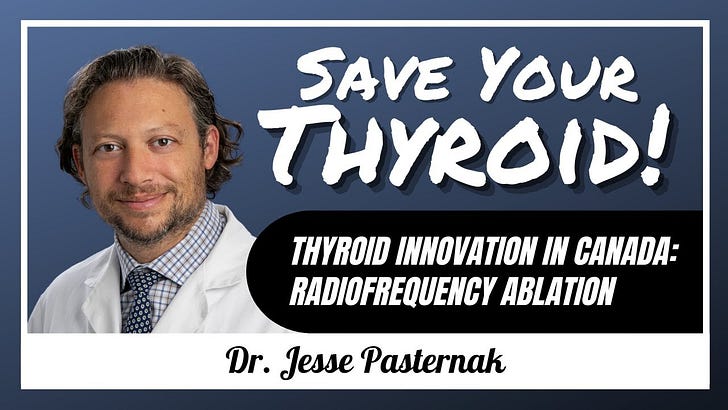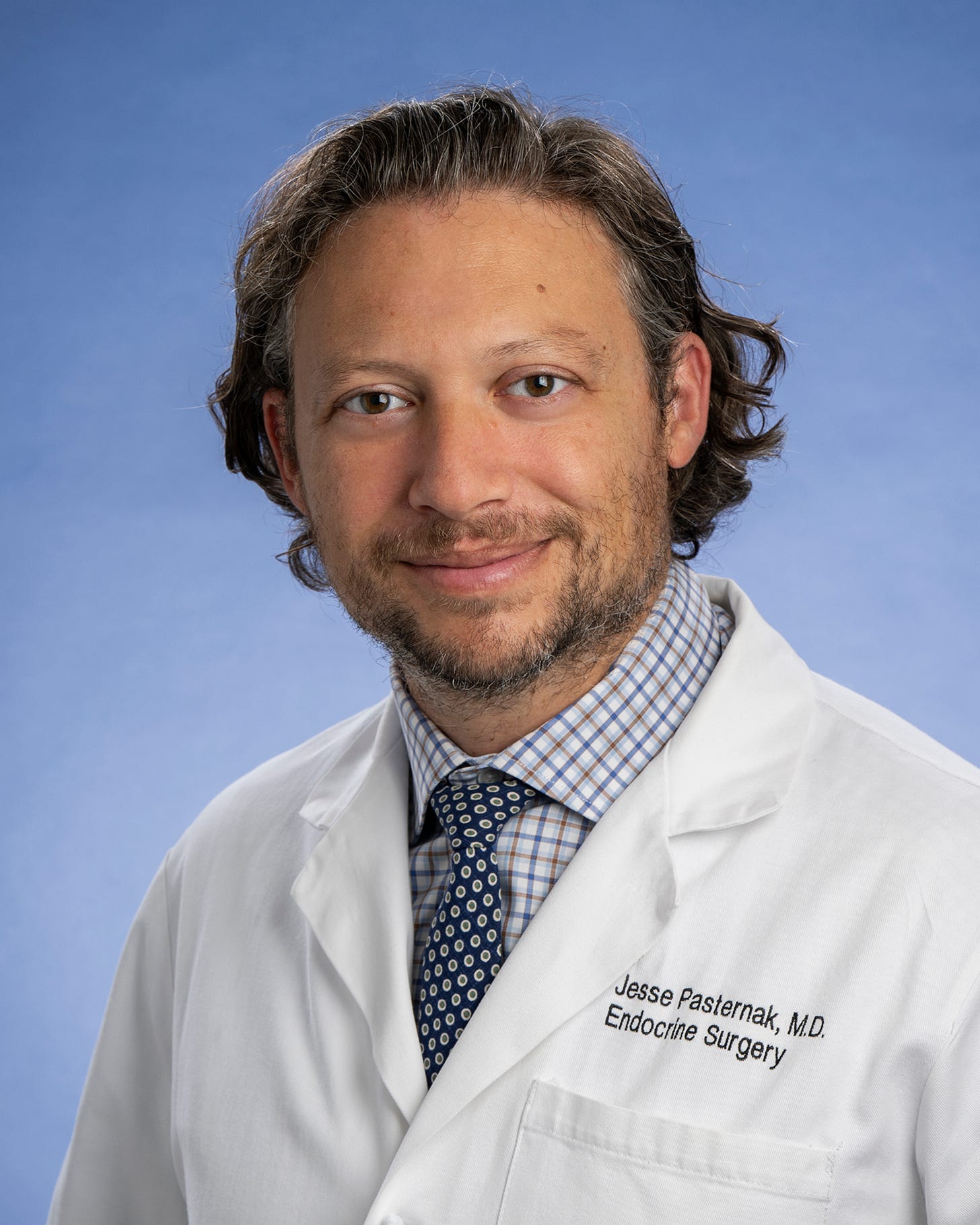Thyroid RFA comes to Canada: Dr. Jesse Pasternak
SAVE YOUR THYROID with Jennifer Holkem: Episode #86
Coming up in this episode:
“I think the whole idea behind endocrine surgery is to try and make what you're doing in the best interest of the patient. You want the patient's treatment to match the patient problem… And the problem is that medicine in general is very slow moving and there's a lot of roadblocks to innovation, mostly related to institutional norms and the way that everybody else does things. And personally, I think that that is why surgery, or at least endocrine surgery, is so ripe for change, because we've been doing literally the same thing related to the thyroid since Theodore Coker got a Nobel prize for changing the way we do this in the early 1900s… So literally it doesn't make sense that we have so much explosion of change in medicine and so many other areas, but in this area we don't really have that much change. And so, that's why — at least for me — [Endocrine surgery] was also a great specialty to go into, because there's so much that you can actually match that… problem that the patient has with a solution.” — Dr. Jesse Pasternak
Watch this episode on YouTube, or download for offline viewing on YouTube Music!
Click the thumbnail above to watch on YouTube!
Watch this episode on Spotify, or download for offline viewing!
Click the thumbnail above to watch on Spotify!
What is this podcast and blog all about?
To my subscribers, welcome back! If you’re new, welcome to Save Your Thyroid, a podcast and blog all about thyroid nodules. My name is Jennifer Holkem, and I advocate for fellow patients suffering with this very common condition. Thyroid nodules impact 70% of adults in their lifetime, and the standard of care is surgical removal of half or all of the gland. But in recent years, safe and effective non-surgical treatment options have become available.
In this podcast and blog, I sit down with patients and physicians to discuss life with thyroid nodules, treatment options, and how to save the thyroid whenever possible.
Meet Dr. Pasternak:
Today’s guess is Dr. Jesse Pasternak, an academic surgeon and patient advocate. He is the chief of Endocrine Surgery in the Division of General Surgery at the University Health Network and Associate Professor in the Department of Surgery at the University of Toronto. His career’s focus is to use up-to-date data to push innovation in the treatment of surgical endocrinology. He is responsible for bringing radiofrequency ablation (RFA) of thyroid nodules to Canada. He is chair of the research committee at the American Thyroid Association and currently runs a trial to treat small thyroid cancers with RFA. He hopes to gain an understanding for cancer outcomes but likely more importantly, the effect of treatment and cancer worry on quality of life and survivorship. He has 3 young kids, all of whom learned where the thyroid was before mastering the head, shoulders, knees and toes.
Key Takeaways:
Dr. Jesse Pasternak is the endocrine surgeon who brought RFA to Canada.
There is a need for innovation in endocrine surgery, and thyroid RFA offers a non-surgical option.
Thyroid RFA can be used to treat benign nodules and “hot” toxic nodules, particularly for symptomatic nodules that do not require surgery, providing symptom relief and improving quality of life.
Thyroid RFA is not appropriate for all types of thyroid cancer, and risk stratification is important in determining the appropriate treatment approach.
Proper diagnosis through biopsy is essential before considering RFA, and multiple biopsies may be necessary in some cases.
RFA can be considered for recurrent thyroid cancer in the lymph nodes after thyroidectomy, but surgical management may also be an option depending on the specific situation.
The availability and accessibility of thermal ablation procedures vary across the globe, and efforts should be made to promote innovation in patient care and ongoing physician education.
Thyroid RFA offers a minimally invasive alternative to surgery for certain thyroid conditions, but individualized treatment decisions should be made based on the patient's specific needs and circumstances.
Episode Summary:
Dr. Jesse Pasternak, an endocrine surgeon, discusses his background and how he became interested in RFA as a non-surgical procedure. He explains the need for innovation in endocrine surgery and the slow pace of change in the field.
Dr. Pasternak shares his journey of bringing RFA to Canada and the challenges he faced in getting it approved. He also discusses the process for patients to seek RFA treatment and the types of thyroid nodules that can be treated with RFA, including benign nodules and hot nodules. He explains the limitations of RFA for thyroid cancer and the importance of risk stratification in determining the appropriate treatment approach.
In this conversation, Dr. Jesse Pasternak answers various questions about thyroid nodules and the use of radiofrequency ablation (RFA) as a treatment option. He discusses the indications for RFA, including the size and characteristics of the nodules, as well as the importance of proper diagnosis through biopsy. Dr. Pasternak also addresses the role of RFA in the treatment of recurrent thyroid cancer and multinodular goiters.
He emphasizes the need for standardized patient care and ongoing physician education to ensure the availability and accessibility of RFA in different countries. Overall, the conversation highlights the potential benefits of RFA as a minimally invasive alternative to surgery for certain thyroid conditions.
The goal of this podcast and blog
I seek to provide data, resources, and expert opinions on the topic of thyroid nodules, and make it accessible to patients. When I was first looking for thermal ablation treatment, everything that I read was physician-facing material. It was very hard for me to understand. This material is meant to help patients understand what's going on in their thyroid gland and what an important gland it is. If you can keep your thyroid intact, that's going to help you live a longer, healthier life, and preserve your quality of life. Thanks for reading this far today! — Jen
Thank you to the sponsor of this episode, Qualisure Diagnostics.
I'd like to take a moment to thank the sponsor of today's episode, Qualisure Diagnostics, developer of Thyroid GuidePx.
Not all thyroid cancers need to be treated with extensive surgery.
Thyroid GuidePx is a test that determines whether papillary thyroid cancer is slow growing or aggressive. Knowing that you have a slow growing cancer may help you and your doctor to decide whether less extensive surgery, RFA or observation is right for you.
If you would like to learn more about the test, email admin@qualisuredx.com - or visit the website, www.qualisuredx.com
A big thanks goes out to Qualisure Diagnostics for supporting this channel by sponsoring this episode.
Connect with Dr. Jesse Pasternak:
👉Dr. Jesse Pasternak’s practice: University Health Network, Endocrine Surgery Clinic
👉Dr. Pasternak’s website: https://www.thyroidrfacanada.ca/
👉Phone: (416) 340-4792
👉Email: jesse.pasternak@uhn.ca
Disclaimer: None of the statements made in this or any other video by "Its me Jen again" should be considered medical advice.
If this post was helpful, please consider leaving a tip. Donations support my advocacy. Thank you!
Visit our community website for more information and find a physician offering nonsurgical treatment options for thyroid cysts, nodules, and cancers!
You can also make a donation to the Save Your Thyroid community via our nonprofit fiscal sponsor ThyCa. Please send an email to donations@thyca.org to designate your gift for SYT. Thanks so much for your support!






